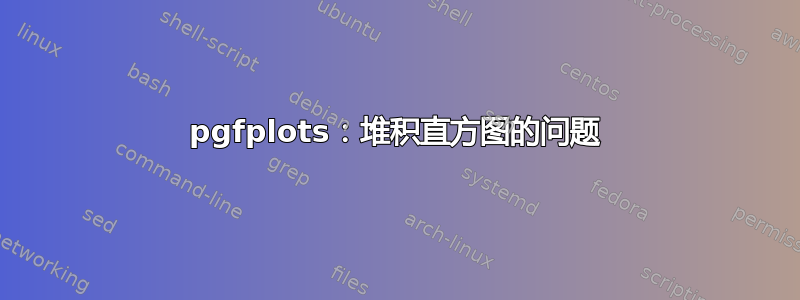
我想使用堆叠直方图绘制具有多个流入和一个流出的节点的数据。我希望绘图如下所示:

首先,我尝试了堆叠直方图(ybar stacked,参见下面的代码),其中我首先绘制负系列,然后将其添加到第一个系列。不幸的是,它确实有效,即使它适用于线条和 area style:


然后我尝试使用单独的axis环境来表示正值和负值,正如这个答案问题是,一旦我更改,堆积直方图就会崩溃ymin- 这是一个错误吗?


我的问题是: 除了我用来创建第一个图的 hack 之外,还有其他方法可以让它工作吗?(在那里,我手动堆叠列 - 对于两个流入来说还可以,但对于五个或更多流入来说非常不切实际 - 虽然我猜它可以编写脚本..)
附言:我意识到这个图形也必须是黑白的,所以我需要使用图案。这让我无法手动堆叠,因为图案有透明的背景——直到我发现这个答案它展示了如何组合图案和填充,这样我就可以得到这个:

以下是所有图形的完整代码:
\documentclass{article}
\usepackage{tikz,pgfplots,pgfplotstable}
\usetikzlibrary{patterns}
\pagestyle{empty}
\begin{document}
\pgfplotstableread{
t in1 in2 out
1 5 2 7
2 3 0 6
3 1 2 5
4 0 4 4
5 1 6 5
6 4 4 6
7 6 2 7
}\flowData
\begin{tikzpicture}
\begin{axis}[small,title=This is what I want,ybar,bar shift=0pt,]
\addplot table[x=t,y expr={-\thisrow{out}}] {\flowData};
\addplot table[x=t,y expr={\thisrow{in1}+\thisrow{in2}}] {\flowData};
\addplot table[x=t,y expr={\thisrow{in2}}] {\flowData};
\end{axis}
\end{tikzpicture}
\
\begin{tikzpicture}
\begin{axis}[small,title=First attempt using ybar stacked,ybar stacked]
\addplot table[x=t,y expr={-\thisrow{out}}] {\flowData};
\addplot table[x=t,y expr={\thisrow{out}+\thisrow{in1}}] {\flowData};
\addplot table[x=t,y=in2] {\flowData};
\end{axis}
\end{tikzpicture}
\begin{tikzpicture}
\begin{axis}[small,title=Check: using lines is OK,stack plots=y]
\addplot table[x=t,y expr={-\thisrow{out}}] {\flowData};
\addplot table[x=t,y expr={\thisrow{out}+\thisrow{in1}}] {\flowData};
\addplot table[x=t,y=in2] {\flowData};
\end{axis}
\end{tikzpicture}
\
\begin{tikzpicture}
\begin{axis}[small,title=Check: using area style is OK,stack plots=y,area style]
\addplot table[x=t,y expr={-\thisrow{out}}] {\flowData} \closedcycle;
\addplot table[x=t,y expr={\thisrow{out}+\thisrow{in1}}] {\flowData} \closedcycle;
\addplot table[x=t,y=in2] {\flowData} \closedcycle;
\end{axis}
\end{tikzpicture}
\begin{tikzpicture}
\begin{axis}[small,title=Test: only inflows,ybar stacked]
\pgfplotsset{cycle list shift=1}
\addplot table[x=t,y=in1] {\flowData};
\addplot table[x=t,y=in2] {\flowData};
\end{axis}
\end{tikzpicture}
\
\begin{tikzpicture}
\begin{axis}[small,title={Test: only inflows with ymin=-8},ybar stacked,ymin=-8]
\pgfplotsset{cycle list shift=1}
\addplot table[x=t,y=in1] {\flowData};
\addplot table[x=t,y=in2] {\flowData};
\end{axis}
\end{tikzpicture}
\pgfplotsset{ % redefine the cycle list used for bar- and area plots
/pgfplots/bar cycle list/.style={/pgfplots/cycle list={%
{blue!80!black,fill=white,postaction={pattern=north east lines,pattern color=blue!75!white}},%
{green!75!black,fill=white,postaction={pattern=crosshatch dots,pattern color=green!90!white}},%
{red!80!black,fill=white,postaction={pattern=crosshatch,pattern color=red!67!white}}}
}
}
\begin{tikzpicture}
\begin{axis}[small,title={This is what I \emph{really} want},ybar,bar shift=0pt,]
\addplot table[x=t,y expr={-\thisrow{out}}] {\flowData};
\addplot table[x=t,y expr={\thisrow{in1}+\thisrow{in2}}] {\flowData};
\addplot table[x=t,y expr={\thisrow{in2}}] {\flowData};
\end{axis}
\end{tikzpicture}
\end{document}
答案1
当我正确理解你的问题时,下面的代码会执行“你真的想要”,对吧?自 PGFPlots v1.13 以来,可以使用新功能轻松实现这一点stack negative=separate。
\documentclass[border=5pt]{standalone}
\usepackage{pgfplots}
\usepackage{pgfplotstable}
\usetikzlibrary{patterns}
\pgfplotsset{ % redefine the cycle list used for bar- and area plots
/pgfplots/bar cycle list/.style={
/pgfplots/cycle list={
blue!80!black,
fill=white,
postaction={
pattern=north east lines,
pattern color=blue!75!white,
}
\\
green!75!black,
fill=white,
postaction={
pattern=crosshatch dots,
pattern color=green!90!white,
}
\\
red!80!black,
fill=white,
postaction={
pattern=crosshatch,
pattern color=red!67!white,
}
\\
},
},
}
\begin{document}
\begin{tikzpicture}
\pgfplotstableread{
t in1 in2 out
1 5 2 7
2 3 0 6
3 1 2 5
4 0 4 4
5 1 6 5
6 4 4 6
7 6 2 7
}\flowData
\begin{axis}[
small,
ybar stacked,
% use new feature from PGFPlots v1.13
stack negative=separate,
]
\addplot table [x=t,y expr={-\thisrow{out}}] {\flowData};
% to produce your *really* wanted output, I had to reverse the
% order of the `in' streams
\addplot table [x=t,y=in2] {\flowData};
\addplot table [x=t,y=in1] {\flowData};
\end{axis}
\end{tikzpicture}
\end{document}



